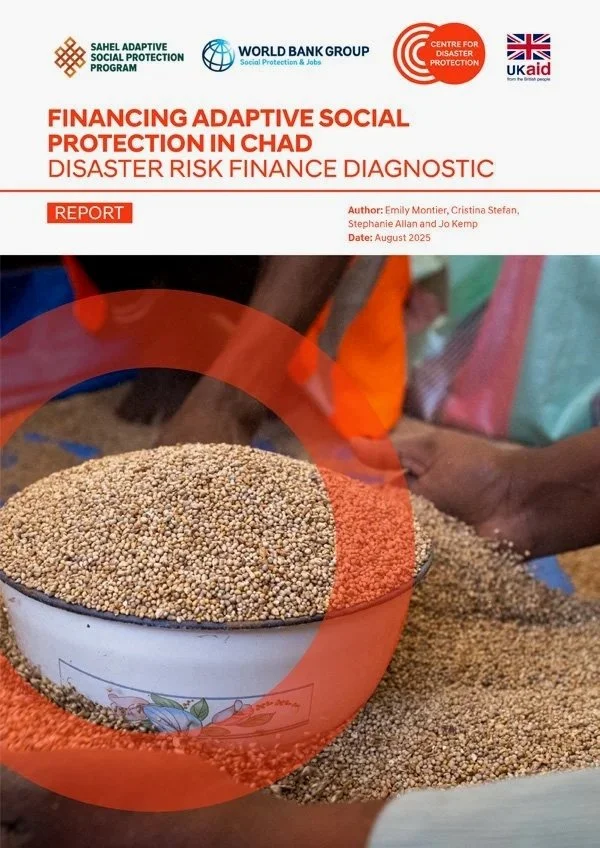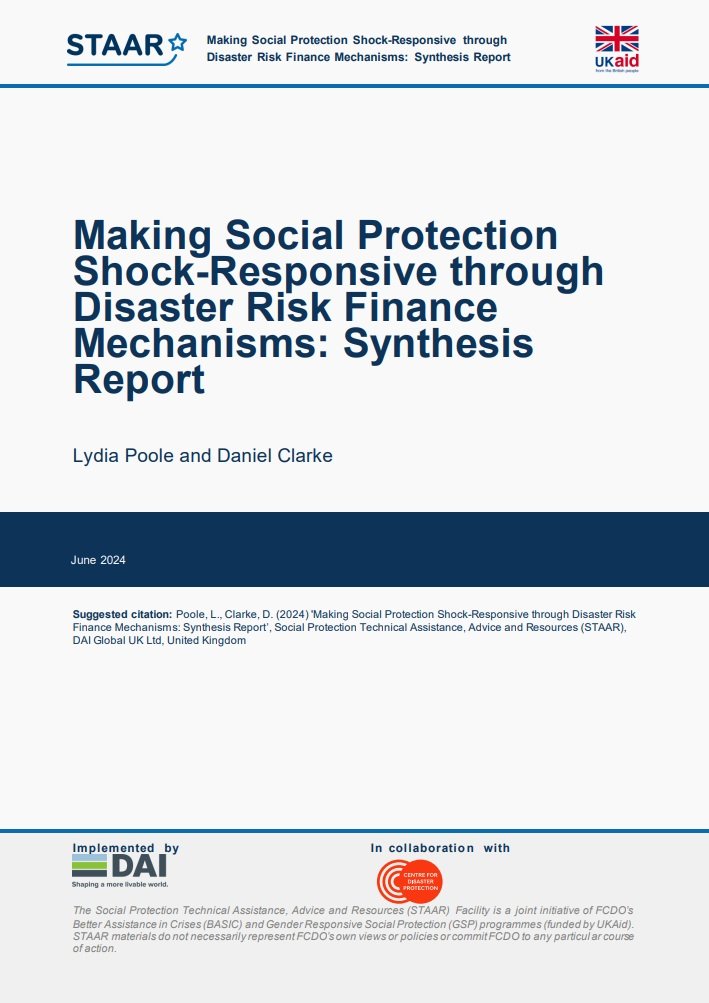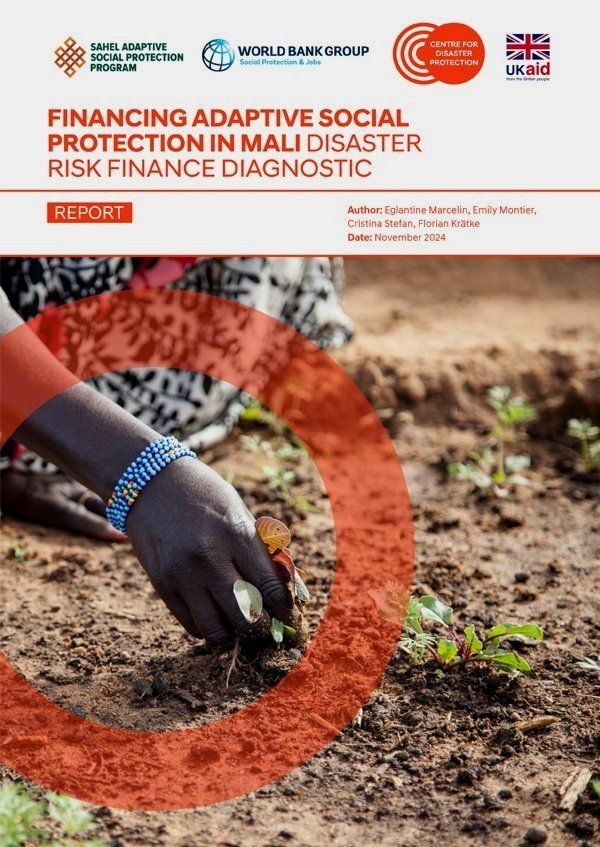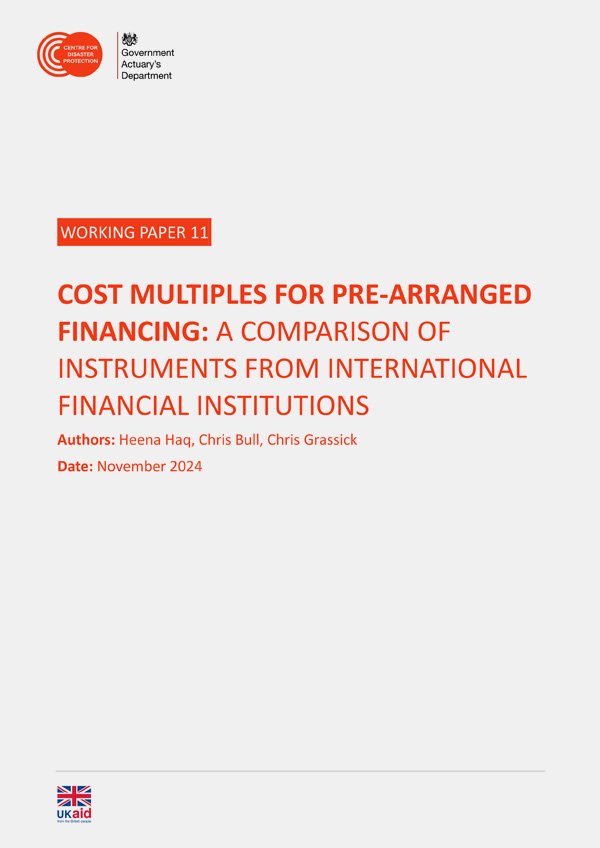ASSESSING VALUE FOR MONEY IN PRE-ARRANGED FINANCING FOR DISASTERS: A PRACTICAL FRAMEWORK

This guidance note has been developed to help the increasing number of countries and organisations that are considering or using pre-arranged financing instruments but are unsure how to approach Value for Money (VfM) analysis. The note aims to provide the reader with an overview of VfM and how it relates specifically to pre-arranged financing, as well as presenting a flexible framework the Centre has developed to approach the process of conducting VfM analysis.
The content is mainly based on the Centre’s experience of supporting national governments and international agencies with VfM analyses. It also captures lessons from other published VfM studies, and perspectives gathered in interviews with people who use and develop similar studies.
RELATED PUBLICATIONS
As part of the Centre for Disaster Protection’s support to the World Bank Sahel Adaptive Social Protection Programme (SASPP), the UK-funded Sahel Shock Response Programme seeks to develop a baseline of in-depth analysis on the social protection and disaster risk financing (DRF) landscape in the Sahel region. This is the third in a series of diagnostic reports, focusing specifically on Chad, aimed at informing the design and programming of the Centre’s support to the SASPP.
This study, conducted in collaboration with the Social Protection Technical Assistance, Advice, and Resources (STAAR) Facility, addresses gaps in evidence on the potential to integrate disaster risk finance (DRF) and social protection systems. The research includes three case studies – Jamaica, Malawi and Mozambique. The study puts forward six lessons and 12 recommendations for donors interested in supporting this agenda.
As part of the Centre for Disaster Protection’s support to the World Bank Sahel Adaptive Social Protection Program (SASPP), the UK-funded Sahel Shock Response Programme seeks to develop a baseline of in-depth analysis on the social protection and disaster risk financing (DRF) landscape in the Sahel region. This is the second in a series of diagnostic reports aimed at informing the design and programming of the Centre’s support to the SASPP.
With growing fiscal constraints, governments and development partners face increasing pressure to maximise the impact of every dollar spent. To address this, the UK Government Actuary’s Department and the Centre for Disaster Protection developed an analytical framework to evaluate the cost-effectiveness of various instruments offered by international financial institutions. This working paper presents a framework that compares contingent loans, grants from multilateral development banks, catastrophe bonds, and insurance provided through regional risk pools. The analysis reveals that while some instruments are more cost-effective for frequent events, others perform better for less frequent, high-impact shocks.
As the toolkit for pre-arranged financing expands, it is becoming increasingly challenging for governments to determine which instrument, or combination of instruments, best meets their needs. There is no silver bullet or single ‘best’ PAF instrument. To help governments and international partners better prepare for disasters, this report offers an in-depth assessment of pre-arranged financing tools using seven key criteria for ensuring pre-arranged financing reduces the human and financial costs of disasters.
As part of the Centre for Disaster Protection's support to the World Bank Sahel Adaptive Social Protection Program (SASPP), the UK-funded Sahel Shock Response Programme seeks to develop a baseline of in-depth analysis on the social protection and disaster risk financing (DRF) landscape in the Sahel region. This is the first in a series of diagnostic reports aimed at informing the design and programming of the Centre’s support to the SASPP.
Available in English and French.
Accountability is a core principle for making Disaster Risk Finance (DRF) work for risk-affected people. Although DRF actors are widely committed to this, there is not yet a shared understanding of what accountability means and how it should be applied. This guidance note is therefore intended as a common framework to support practical approaches to meaningful accountability across the sector, with the aim of assuring financing that is in the best interest of the at-risk communities that it seeks to serve. It can be used by anyone involved in DRF, including those promoting, designing, delivering and supporting DRF.







